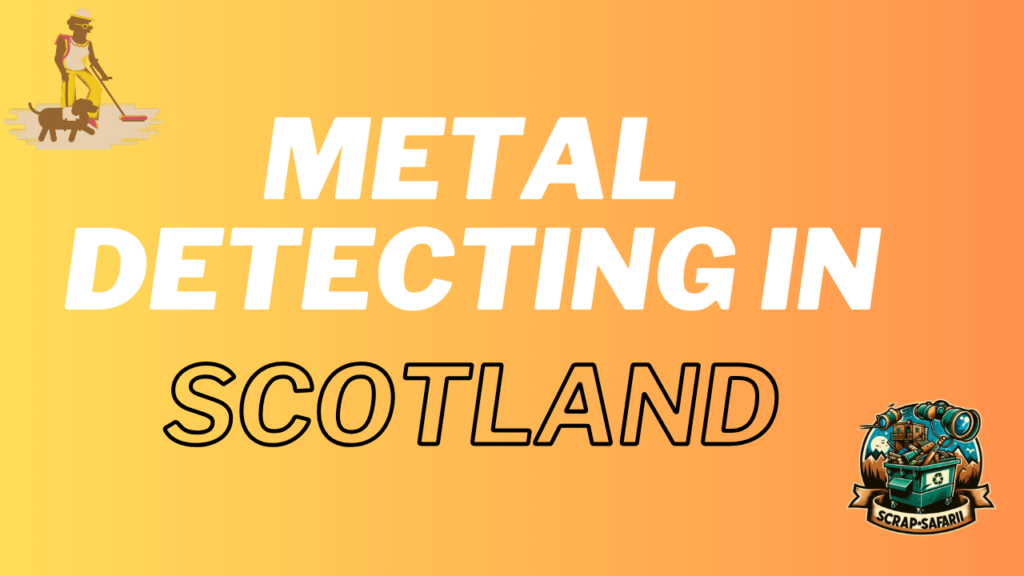Metal detecting is a popular hobby in Scotland, with enthusiasts scouring the country’s fields, beaches, and parks in search of buried treasures from the past. While the thrill of uncovering historical artifacts is undeniable, it’s crucial to understand that metal detecting in Scotland is legal only with proper permissions and adherence to specific regulations.
Scotland’s rich history and diverse landscapes make it a prime destination for metal detectorists. From ancient Roman settlements to medieval battlefields, the country’s soil holds countless secrets waiting to be unearthed. However, responsible metal detecting is key to preserving Scotland’s cultural heritage and ensuring the hobby remains accessible for future generations.
With the right approach and respect for the laws, metal detecting in Scotland can be an exciting and rewarding pursuit. By following the guidelines outlined in this guide, hobbyists can embark on their quests while contributing to the preservation of Scotland’s archaeological treasures.
Is Metal Detecting in Scotland Legal?
Metal detecting is legal in Scotland, but some important regulations and laws must be followed. First and foremost, you must obtain explicit permission from the landowner before metal detecting on any private land. Detecting without permission is considered trespassing and can result in penalties.
Scotland has specific “Treasure Trove” laws that govern the discovery and ownership of valuable historical artifacts. If you find any object that could potentially be considered treasure, you are legally required to report it to the Queen’s and Lord Treasurer’s Remembrancer (QLTR) office. Failure to report valuable finds can lead to prosecution and significant fines.
The definition of “treasure” in Scottish law includes any culturally significant artifacts, such as coins, jewelry, or other objects made of precious metals that are over 300 years old. It also covers any groups of coins or other valuable objects found together, regardless of age. If you’re unsure whether your find qualifies as treasure, it’s best to err on the side of caution and report it.
While the penalties for not reporting treasure can be severe, there are also incentives for doing so. If your reported find is deemed to be treasure, you may be eligible for an ex-gratia payment from the Scottish government, which can be a significant reward for historically valuable discoveries.
Where You Can Detect in Scotland
In Scotland, there are several areas where you can legally metal detect with the proper permissions. Parks and beaches are generally open for detecting, but you’ll need to obtain permission from the local council that manages the land. Many councils have a straightforward process for applying for a metal detecting permit.
Farmland is another popular area for metal detectorists, as these lands have often been cultivated for centuries, increasing the chances of finding historic artifacts. However, you must get explicit permission from the landowner before detecting on private farmland. Most farmers are open to responsible detectorists as long as you respect their property.
It’s crucial to avoid scheduled monuments and protected archaeological sites in Scotland. These areas are off-limits to metal detecting to preserve their historical and cultural significance. Detecting on these sites without proper authority can result in severe penalties.
Etiquette and Best Practices For Metal Detecting in Scotland
As a responsible metal detectorist in Scotland, it’s crucial to follow proper etiquette and best practices to preserve the natural environment and maintain good relationships with landowners. Firstly, always ensure that you fill in any holes you dig during your detecting activities. Leaving holes unfilled can create hazards for people, animals, and machinery, and it’s disrespectful to the landowner.
Secondly, it’s essential to leave no trace of your presence on the land. This means collecting and disposing of any litter or debris you may encounter, and avoiding any actions that could damage the natural surroundings. Remember, you’re a guest on someone else’s property, and it’s your responsibility to treat it with respect.
Thirdly, respect any areas or specific locations that the landowner has asked you to avoid. They may have valid reasons for these restrictions, such as protecting sensitive habitats or preserving historical sites. By adhering to their requests, you demonstrate your commitment to responsible metal detecting and increase the chances of being granted future access.
Finally, and perhaps most importantly, only metal detect on land where you have explicit permission from the landowner or the appropriate authorities. Detecting without proper authorization is illegal and can result in severe penalties. Always obtain the necessary permits or written consent before engaging in any metal detecting activities.
What to Do If You Find Treasure
If you’re metal detecting in Scotland and make an exciting find that you believe may be considered treasure, it’s crucial to follow the proper reporting procedures. Under Scottish law, any objects that are at least 300 years old when discovered, and have been deliberately concealed by the owner, are classified as treasure trove.
The reporting process involves contacting the Scottish Treasure Trove Unit, providing details about the find, and submitting the artifacts for examination by experts. This process ensures that historically and culturally significant objects are properly preserved and studied.
While you may not get to keep the treasure itself, there are incentives for reporting your finds. The Scottish Treasure Trove system operates on the principle of ex gratia payments, which means that finders can receive a reward based on the market value of the artifacts. These rewards serve as an acknowledgment of your responsible conduct and contribution to preserving Scottish heritage.
Many local museums in Scotland are actively interested in acquiring treasures and artifacts that help tell the story of their region’s history. By reporting your finds, you’re playing a vital role in enriching these museum collections and ensuring that pieces of Scotland’s past are available for public education and appreciation.
Where to Metal Detect in Scotland
Scotland’s diverse landscapes offer plenty of promising areas for metal detectorists to explore. From ancient battlefields and medieval settlements to shorelines and farmlands, the country’s rich history has left behind a wealth of potential treasures waiting to be discovered.
When planning your detecting adventures in Scotland, it’s essential to research potential sites thoroughly. Study historical records, maps, and local lore to identify areas that may have witnessed significant events or human activity in the past. Battlefields, old trade routes, and abandoned settlements can be particularly fruitful for finding relics and artifacts.
The rugged terrain of the Scottish Highlands can yield exciting finds, especially near former clan strongholds or along ancient drove roads used for cattle droving. The remote glens and valleys may have seen skirmishes or encampments, leaving behind remnants of bygone eras.
Coastal areas and beaches are also prime locations for metal detecting in Scotland. Shipwrecks, lost cargo, and discarded items from maritime activities can often be found along the shorelines, particularly in areas with a rich seafaring history.
Farmlands and fields can be equally rewarding, as these areas have been cultivated and inhabited for centuries. Old homesteads, forgotten hamlets, and even ancient burial sites may lie beneath the surface, offering a glimpse into Scotland’s agricultural past.
Before embarking on a metal detecting expedition, it’s crucial to conduct thorough research on the specific area you plan to visit. Consult local historians, metal detecting clubs, and online forums to gather insights and tips from experienced detectorists who have explored the region. This information can help you maximize your chances of making exciting discoveries while respecting the local laws and regulations.
Summary and Resources
Scotland has a rich history and many areas well-suited for the hobby of metal detecting. However, it’s crucial to pursue this pastime legally and ethically. Always obtain explicit permission from landowners before metal detecting on any private property. Respect any areas they ask you to avoid.
When detecting on public lands like parks and beaches, you still need to secure permission from the local council. Protected areas and scheduled monuments are off-limits. Scotland’s Treasure Trove laws require that any objects of historical significance or monetary value be reported to the appropriate authorities.
Most landowners will grant permission for responsible metal detecting if you simply ask politely. Follow best practices like filling any holes, leaving no trace of your activity, and being mindful of areas with potential archaeological sensitivity.
If you do happen to make a significant find qualifying as treasure, there is an established process for reporting it, with incentives for finders to come forward. Museums have a vested interest in preserving local history.
For beginners, there are many great online resources and local clubs that can provide guidance on getting started, properly researching permissions and regulations, and connecting with the metal detecting community in Scotland. With the right approach, this can be an enjoyable and rewarding hobby.

Meet Emily, our passionate metal detectorist and history enthusiast. With her trusty Manticore and Deus 2 metal detectors by her side, she delves deep into the earth, unearthing hidden treasures and untold stories from the past. Through her adventures documented on Instagram and YouTube, Emily invites you to join her on a journey of discovery, where every find tells a tale. Whether it’s ancient artifacts or forgotten relics, she’s dedicated to sharing the excitement and wonder of the world beneath our feet. Follow along with Emily on her quest to uncover the secrets of history at scrapsafari.com.


